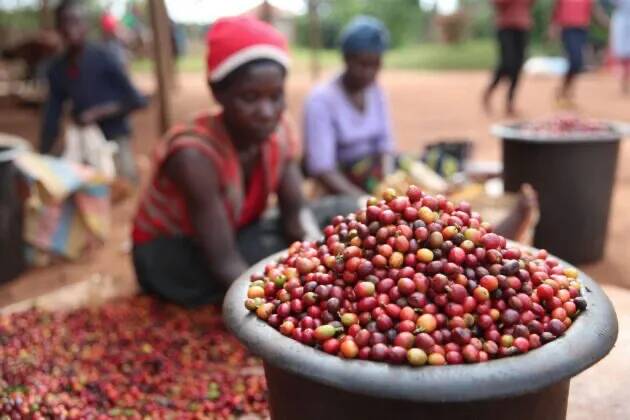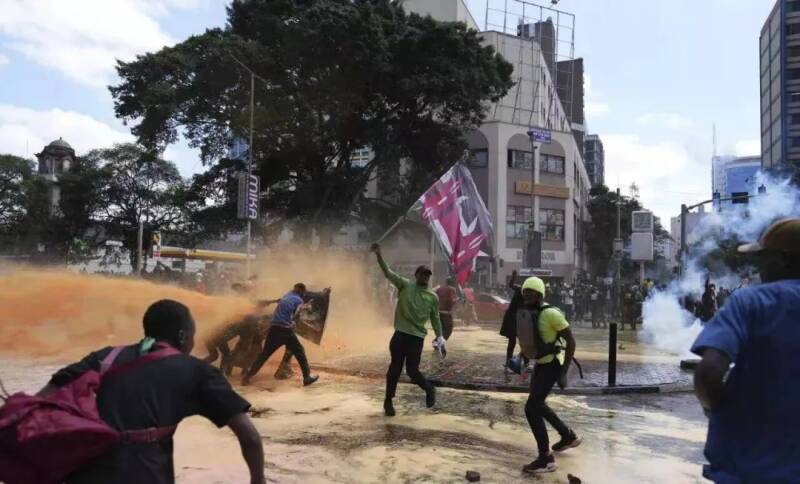Demonstrations break out in Kenya! New government policy threatens coffee industry
Earlier, the United States Department of Agriculture released the current situation of the coffee industry in Kenya, and the report pointed out that the impact of earlier torrential rains and the reduction in coffee acreage is expected to produce 750000 bags (60 kg / bag) of coffee in Kenya in the marketing year 2024. Down 6.3% from the previous marketing year.
However, in order to improve the coffee industry, the government is taking steps to expand coffee production to 102000 metric tons by 2027, an increase of 55 per cent over current coffee production.

And President William Ruto announced that he had approved 6.7 billion shillings in the debt cancellation of cooperatives and that the government had allocated 4 billion shillings to the Coffee Cherry Fund, which would benefit farmers.
But recently, according to Kenyan local media reports, the Kenyan capital Nairobi anti-tax demonstrations broke out, during the police and demonstrators clashed, resulting in a number of deaths and injuries. And, at a later time, demonstrations in Nairobi spread to other parts of Kenya, with clashes in many places, with many calling for President William Ruto to step down and oppose tax increases.

It is understood that according to the data released by the Kenyan Ministry of Finance, Kenya's current foreign debt is about 36.66 billion U.S. dollars (about 4.7 trillion shillings). To this end, in early June, Kenya reached a preliminary agreement with the International Monetary Fund to obtain US $1.1 billion, but due to Kenya's limited repayment capacity, the Kenyan Government decided to increase tariffs in order to obtain more funding.
The conflict was triggered by the government's new fiscal bill, which will raise 346.7 billion Kenyan shillings ($2.67 billion) in additional taxes to continue to pay interest on high sovereign debt.
The new tax increase will impose a 16% VAT on the purchase of bread, sugar transportation, the use of mobile communications and financial services, and foreign currency transactions. However, for the people, they have been facing the pressure of life, as well as the continuous impact of the earlier COVID-19 epidemic, geopolitical economic shocks such as rising prices and currency devaluation, and resentment against the government has been accumulated, which eventually led to violent conflicts.
For the local coffee industry, bread is one of the staple foods of Kenyan farmers, and coffee beans are basically traded in US dollars in the international market. If the VAT is increased by 16%, the operating costs of farmers will increase.
However, according to the latest news from Reuters, the Kenyan president has withdrawn his tax increase plan, and although the president has made concessions, he is still prepared to hold a rally after that.
Coffee industry insiders said that several coffee processing plants in Kenya (including the world-renowned NKG company) have stopped operating as a result of earlier government implementation of new coffee regulations. As a result, farmers now have to handle coffee in designated and licensed factories, but some small factories have cargo accumulation and logistics challenges, and workers have taken part in the demonstrations. as a result, some coffee cherries have rotted due to delays in processing and understaffing, resulting in reduced final exports and reduced income.
In addition, it is considered that productivity and production efficiency should be improved at present, while actively expanding domestic and foreign markets and international influence to sell products. Instead of raising taxes on the people, although the tax increase plan has been withdrawn, it is uncertain about the government's future policy and believes that the future of coffee and other industries is still uncertain.
Important Notice :
前街咖啡 FrontStreet Coffee has moved to new addredd:
FrontStreet Coffee Address: 315,Donghua East Road,GuangZhou
Tel:020 38364473
- Prev

It's too difficult for working people ~ Give bad reviews to coffee shops if you don't give blankets??
▲ Click to pay attention| Daily Boutique Coffee Culture Magazine Coffee Workshop Recently, a coffee shop comment aroused heated discussion among netizens. The person who made this comment was a mother who took her four-year-old child to the mall and took the child to the sofa in a coffee shop to rest because the child fell asleep. But the temperature in the store is low,
- Next

Civil War and increased taxation! Ethiopia's coffee industry faces new challenges
Recently, according to local media reports in Ethiopia, the director of the Ethiopian Coffee and Tea Authority (ECTA) said that Ethiopian coffee has performed well in the Chinese market, with sales increasing by an average of 27% in recent years. In previous years, Ethiopia exported about 8000 to 10,000 tons of coffee beans to China every year.
Related
- What grade does Jamaica Blue Mountain No. 1 coffee belong to and how to drink it better? What is the highest grade of Blue Mountain coffee for coffee aristocrats?
- What are the flavor characteristics of the world-famous coffee Blue Mountain No. 1 Golden Mantelin? What are the characteristics of deep-roasted bitter coffee?
- Can I make coffee a second time in an Italian hand-brewed mocha pot? Why can't coffee be brewed several times like tea leaves?
- Hand-brewed coffee flows with a knife and a tornado. How to brew it? What is the proportion of grinding water and water temperature divided into?
- What is the difference between Indonesian Sumatra Mantinin coffee and gold Mantinin? How to distinguish between real and fake golden Mantelin coffee?
- What does bypass mean in coffee? Why can hand-brewed coffee and water make it better?
- Unexpected! Ruixing Telunsu lattes use a smoothie machine to foam milk?!
- % Arabia's first store in Henan opens into the village?! Netizen: Thought it was P's
- Does an authentic standard mocha coffee recipe use chocolate sauce or powder? Mocha Latte/Dirty Coffee/Salty Mocha Coffee Recipe Share!
- What is the difference between Vietnam egg coffee and Norway egg coffee? Hand-brewed single product coffee filter paper filter cloth filter flat solution!

